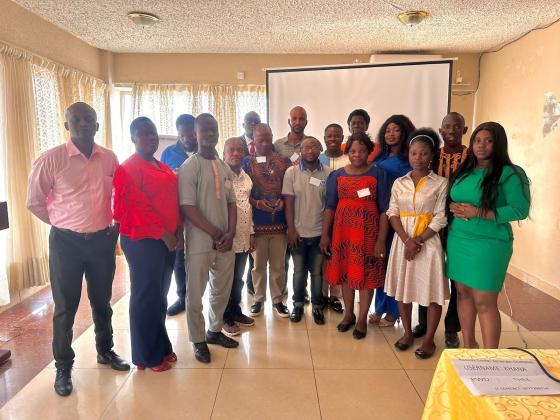Liberian CSOs Performances "Unchanged" in 2021 Sustainability Index

-- Khana Group Launches Report-
Monrovia -The overall sustainability report of Liberian Civil Society Organizations (CSOs) in 2021 was deemed "unchanged" when compared to 2020, owing to significant challenges and breakdowns interspersed with minor improvements.
The Khana Group, a social impact advisory firm, conducted the report, which blamed the CSOs' failure on the deadly COVID-19 pandemic, which claimed more lives in 2020 than HIV, malaria, and tuberculosis combined.
According to the report, CSOs earned 4.9 points out of seven dimensions in comparison to 4.5 points in 2020.
Launching and disseminating the "Index" on Thursday, 15th December, Vanessa Smith of Khana Group said the CSOs Sustainability Index of 2021, was released in November 2022, and developed developed by the United States Agency for International Development, Bureau for Democracy, Conflict and Humanitarian Assistance and Center for Excellence in Democracy, Human Rights and Governance.
She intimated that the local partner in Liberia is the Khana Group (TKG) with the recruitment and training of over 300 data collectors/researchers.
Accordingly, the 2021 Index named three indicators (dimensions) as stable (unchanged) and one deteriorated. Financial viability, Organizational Capacity and sectoral infrastructure were unchanged or stable in 2021 while advocacy was progressively worse.
The report said the slightly improved indicators of the CSOs were legal environment, service provision and public image.
Under the year under review (2021) in the Index, advocacy deteriorated as CSOs faced interference in their activities, including an inability to obtain information from government sources.
Most government officials were uncomfortable sharing information with CSOs and responding and CSOs’ efforts to engage in advocacy in 2021 were further frustrated by their difficulty in obtaining permits to protest and the blackout of some media, starting with the government’s ban of a popular talk-show program.
Also, CSOs’ financial viability was unchanged in 2021. Liberian CSOs were sorely underfunded and have few sources of revenue other than international donors. Most CSOs depend on single donors for intermittent, project-based funding and the infrastructure supporting the CSO sector was challenged and the deplorable situation didn't improve. Liberia has only a few resource centers and intermediary support organizations providing training and other support to CSOs. Since they are largely dependent on foreign funding, their capacities and reach are limited.
Further, CSO's organizational capacity was unchanged (stable). The Index further noted that engaging with constituencies was a serious challenge for most CSOs in 2021. Although recent years have seen some improvement, CSOs still find it difficult to build relationships with individuals and groups that should benefit from their services. For example, the report said, beneficiaries often expect to be paid to attend meetings organized by CSOs, and many organizations lack the resources to meet this expense.
Meanwhile, the legal environment improved slightly thanks to the implementation of the National Aid and Non-Governmental Organization (NGO) Policy, which offers clearer guidelines for NGO operations and an easier process for incorporation and accreditation. The NGO Coordination Unit of the Ministry of Finance, Planning, and Development accredited 166 local and 40 international NGOs or a total of 206 organizations in 2021, compared to 710 organizations in 2020. These figures reflect only organizations applying for accreditation in 2021 rather than all NGOs operating in the country, the number of which is unknown.
More than 1,500 CSOs are registered with the National Civil Society Council of Liberia, according to the European Union (EU)’s Supporting Effective Advocacy in Liberia (SEAL) project. The number of unregistered organizations is thought to be high. Many of them exist in name only but are reactivated quickly when grant opportunities arise.
And service provision was slightly stronger as CSOs were better able to provide goods and services to address urgent needs. The sector’s public image improved slightly as CSOs became more aware of the importance of public relations and media campaigns, including on social media.
Eric Massaley, lecturer at the United Methodist University (UMU), thanked the Khana group for helping to boost the capacity of his institution, while calling on the government to come up with a clear policy on drug abuse in Liberia.
According to him, the proliferation of ghettos across the country is giving rise to the increase of disadvantaged youth across the country.
“Our intent is to have the government write a clear policy on drugs in Liberia,” he said.
